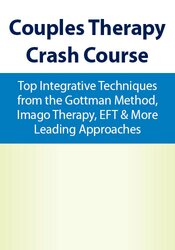

Couples therapy is more popular than ever before.
Even therapists seeing primarily individuals are finding that they need to know the basics …
… and seasoned therapists know a diverse toolkit is essential for effective therapy.
That’s where this training comes in – while many programs focus only on a singular approach, in this workshop you get step-by-step instructions on how to use a distinctly integrative framework for start to finish couple’s therapy.
You’ll watch Dr. Jill Squyres Groubert, celebrated author, viral TedTalk speaker, and master couples’ therapist. She’ll reinvigorate your love for your job by making couples therapy fun, engaging, and you’ll even get to practice key interventions, so you’ll feel more confident in sessions.
Walk away with concrete skills from evidence-based approaches including the Gottman Method, Imago Therapy, Emotionally Focused Therapy, CBT, Internal Family Systems Therapy, Attachment-Based strategies and more. Gain enhanced training in …
Whether you’re looking to refresh your education as a couple’s therapist or expand your scope of practice this course takes you there.
Enroll now!
Planning Committee Disclosure - No relevant relationships
All members of the 小蝌蚪视频. planning committee have provided disclosures of financial relationships with ineligible organizations and any relevant non-financial relationships prior to planning content for this activity. None of the committee members had relevant financial relationships with ineligible companies or other potentially biasing relationships to disclose to learners. For speaker disclosures, please see the faculty biography.
Continuing education credit information is coming soon for this non-interactive self-study package.
CE hours may be available for select professions, as listed in the target audience. Hours will be dependent on the actual recording time. Please check with your state licensing board or organization for specific requirements.
There may be an additional fee for CE certificates. Please contact our Customer Service at 1-800-844-8260 for more details.
**Materials that are included in this course may include interventions and modalities that are beyond the authorized practice of your profession. As a licensed professional, you are responsible for reviewing the scope of practice, including activities that are defined in law as beyond the boundaries of practice in accordance with and in compliance with your professions standards.

Jill Squyres Groubert, PhD, a nationally respected clinical psychologist and has a counseling and coaching practice in Arvada, Colorado. Dr. Groubert earned her BA in psychology from The University of Rochester. She received her MA and PhD in clinical psychology from the University of Southern California. After serving as a project director for Western Psychological Services Publishing for three years, she spent 11 years as a staff psychologist for the Department of Veteran’s Affairs where she specialized in treating patients with serious medical illnesses and spinal cord injuries as well as participating in intern and post-doc training.
She’s served as president of the Bexar County Psychological Association and on the boards of the Texas Psychological Association, SpeakUp ReachOut: The Suicide Prevention Coalition of the Eagle River Valley, and the Suicide Prevention Coalition of Colorado. She was on the faculty of the Telemental Health Institute in San Diego where she wrote a weekly blog and provided course content. In her private practice in Arvada, Colorado, she regularly treats individuals and couples struggling with a variety of concerns including relationship problems, trauma, depression, anxiety, interpersonal issues, and health issues. In addition to her recently published book 8-Week Couples Therapy Workbook, she’s published numerous papers, articles, and book chapters. Dr. Groubert has given a popular TED talk called Why Can’t We Be Friends? with over 160,000 views. She’s a dynamic speaker who’s given numerous talks on a variety of topics. She has appeared on TV and radio programs and has been interviewed for many newspaper and magazine articles.
Speaker Disclosures:
Access never expires for this product.
Visit our FAQ page at www.pesi.com/faq or contact us at www.pesi.com/info
Satisfaction Guarantee
Your satisfaction is our goal and our guarantee. Concerns should be addressed to: PO Box 1000, Eau Claire, WI 54702-1000 or call 1-800-844-8260.
ADA Needs
We would be happy to accommodate your ADA needs; please call our Customer Service Department for more information at 1-800-844-8260.
小蝌蚪视频 Mobile App
Access CE trainings on your phone or tablet through our free mobile app. Choose video or audio-only versions of online courses from the world’s best instructors, and complete your CE requirements anywhere, anytime, at your own pace.
Please wait ...